7 Best Chemistry Courses for 2025
If you’re an absolute beginner or already know some chemistry and want to learn more, see our handpicked guide to the best general chemistry courses.

Quick Access:
- With Free Certificate
- With ACE Credit
- Also with Possible Credit
- Most Popular
- University-Level Beginner Course
- Advanced course
- Learning Nomenclature.
Are you interested in an online chemistry course? Plenty are available, from the basics to more advanced studies. Chemistry also has several sub-fields. Analytic, physical, and organic chemistry are just a few examples, but this Best Courses Guide (BCG) focuses on general chemistry. I’ve chosen highly-rated courses, some of which offer academic credit for students at eligible institutions (make sure to check your eligibility with your institution).
Some courses in this BCG require some mathematical skills or previous chemistry knowledge, while others are for absolute beginners. And if you find nomenclature (naming of chemical compounds) confusing, check the free short course that will help you understand and learn the terminology more easily.
Chemistry can be challenging to learn, particularly if you’re not in a physical classroom, so make sure to look for the links to our learning guides. And don’t forget the What Else? section for more resources.
Click on the shortcuts for more details:
- Top Picks
- What is Chemistry?
- Courses Overview
- What Else?
- Why You Should Trust Us
- How We Made Our Picks and Tested Them
Here are our top picks
Click to skip to the course details:
Learning Guides
What is Chemistry?
Chemistry is the scientific study of the properties, composition, and structure of matter, as well as the changes it undergoes during chemical reactions. It’s a central science involved in various fields and industries.
A strong background in chemistry is needed for many careers, including:
- Healthcare and Medicine
- Scientific Research
- Engineering and Technology
- Science Writer/Editor
- Patent Attorney
- Chemical Sales Representative
- Quality Assurance Officer
- Teacher/Lecturer
- Policy Analyst
- Project/Program Manager
Problem-solving and research skills learned while studying chemistry are also helpful for other careers.
Courses Overview
- 5 courses are free or free to audit and 2 are paid
- 4 courses offer a certificate of completion or credit for eligible colleges
- The chemistry subject is followed by 89.9K learners on Class Central
- The most featured provider is Coursera with 2 courses.
Best General Chemistry Course with Free Certificate (Saylor Academy)
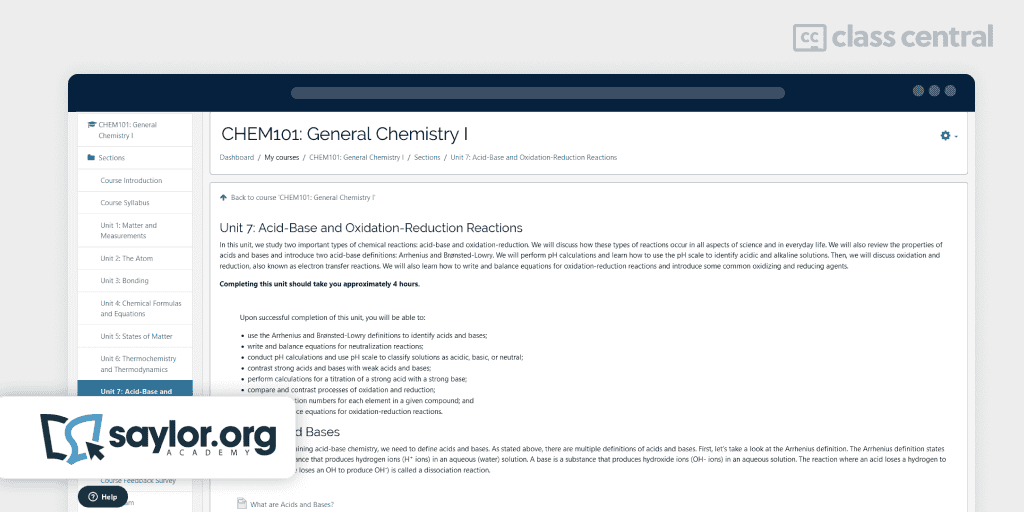
CHEM101: General Chemistry I is a free, text-based course from Saylor Academy. Study the material, pass the exam and earn a free certificate. Alternatively, pay for online proctoring to earn college credit – just make sure to check if your college accepts it!
This course will give beginners a solid understanding of general chemistry concepts.
Syllabus:
- Matter and measurements
- The atom
- Bonding
- Chemical formulas and equations
- States of Matter
- Thermochemistry and thermodynamics
- Acid-base and oxidation-reduction reactions
- Nuclear chemistry.
| Provider | Saylor Academy |
| Time Commitment | 36 hours |
| Cost | Free |
| Quizzes/Assessment Items | Free |
| Certificate | Free |
Best General Chemistry Course with ACE Credit (StraighterLine)
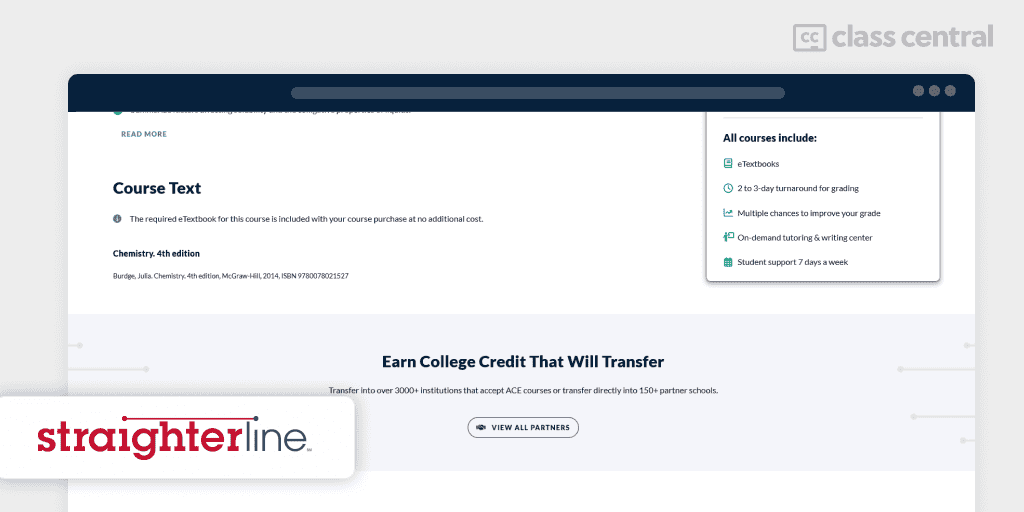
Check if your institution is among over 3000 that recognise ACE credit towards your qualification. If so, earn 3 ACE credits for General Chemistry I. The required e-textbook is available at no extra cost.
Learn about:
- Nature of matter
- Stoichiometry
- Phase changes and properties of liquids, solids, and gases
- Solubility, colligative properties, Intermolecular forces and chemical reactions
- Quantum theory
- Atomic structure and chemical periodicity
- Laws of thermodynamics
- Entropy
- Radioactive decay and radioisotopes.
If you need additional support, online tutoring is available for no extra cost.
| Provider | StraighterLine |
| Time Commitment | 28 days |
| Cost | Paid |
| Quizzes/Assessment Items | Included |
| ACE Credit | Included |
Also Great General Chemistry Course with College Credit (Study.com)
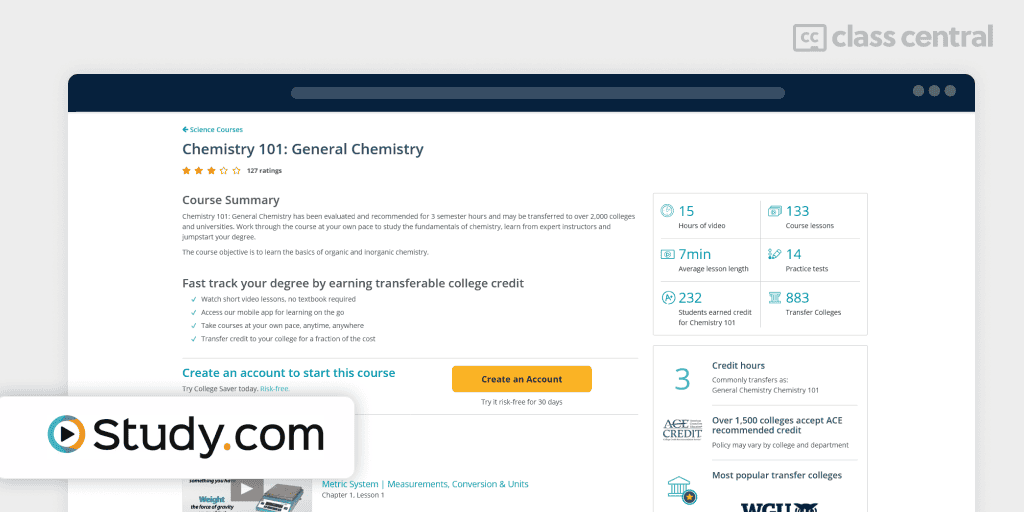
Chemistry 101: General Chemistry is a comprehensive online course designed for students to earn 3 semester hours transferable to over 2,000 colleges and universities. The course covers fundamental concepts of chemistry, allowing you to learn at your own pace and jumpstart your degree with guidance from expert instructors. Remember to check if your institution accepts the transfer credit.
Syllabus:
- Experimental chemistry and introduction to matter
- Atoms and the periodic table
- Nuclear chemistry
- Chemical bonding
- Liquids, solids, and gases
- Solutions
- Stoichiometry
- Chemical reactions, equilibrium, kinetics, and thermodynamics.
| Provider | Study.com |
| Time Commitment | 18 hours |
| Enrollment | 11.4K |
| Cost | Paid |
| Quizzes/Assessment Items | Included |
| College Credit | 3 credit hours |
Most Popular General Chemistry Course (CrashCourse)
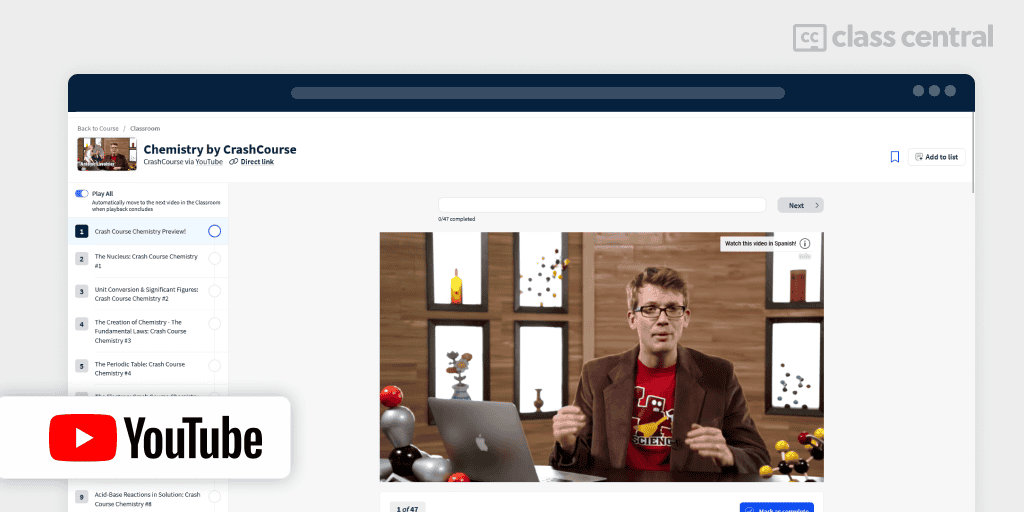
Maybe you just want a free overview of chemistry. Chemistry by CrashCourse has been viewed more than 24 million times! It’s based on the 2012 AP Chemistry curriculum and aims to provide you with a solid foundation in chemistry including some introductory organic chemistry. The course also includes flashcards for revision, available on the Crash Course App for both Apple and Android devices.
Topics covered in this course:
- The nucleus and atomic structure
- Basic chemistry concepts
- The Periodic Table and chemical bonds
- Chemical reactions and stoichiometry
- Nomenclature
- States of matter and gas laws
- Thermodynamics and kinetics
- Solid state chemistry
- Electrochemistry and nuclear chemistry
- Hydrocarbons and organic chemistry
- Environmental chemistry
| Provider | YouTube |
| Channel | CrashCourse |
| Instructor | Hank Green |
| Time Commitment | 8 hours |
| Views | 24.8M |
| Rating | 5.0/5.0 (1) |
| Cost | Free |
| Quizzes/Assessment Items | Flashcards via the app for Apple or Android |
| Certificate | Not available |
Great University-Level Chemistry Course (Duke University)
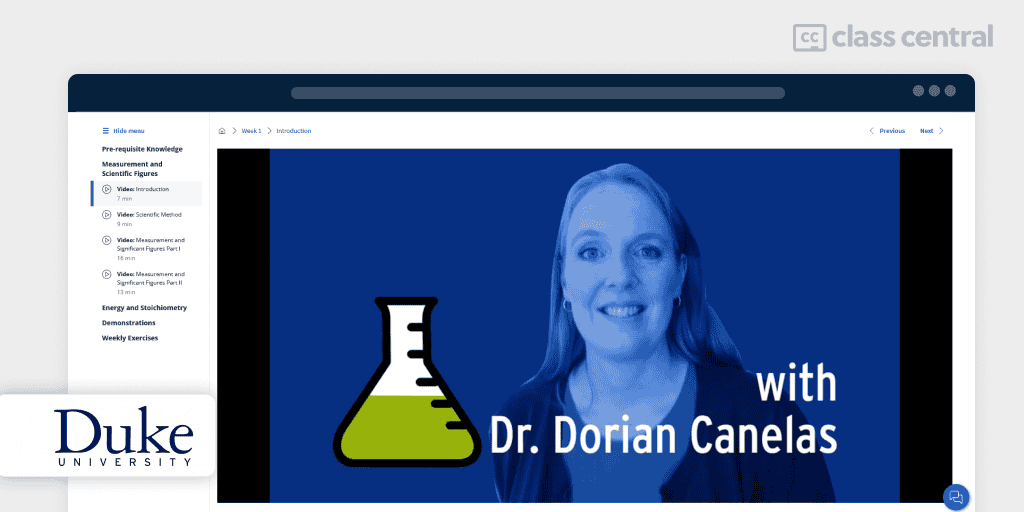
Introduction to Chemistry: Reactions and Ratios is for students with limited chemistry background, but a strong foundation in algebra is needed to solve some of the problems.
The course covers:
- Introduction and scientific methods
- Matter, energy, and stoichiometry
- Compounds and formula masses
- Chemical composition and reactions
- Solutions, solubility rules, and precipitations
- Acid-base and redox reactions.
For more chemistry knowledge, take the companion course Introduction to Chemistry: Structures and Solutions (17 hours).
| Provider | Coursera |
| Institution | Duke University |
| Instructor | Dorian Canelas |
| Time Commitment | 18 hours |
| Enrollment | 118.5K |
| Rating | 4.7/5.0 (1.1K) |
| Cost | Free |
| Quizzes/Assessment Items | Free access |
| Certificate | Paid |
Best Advanced Chemistry Course (University of Kentucky)
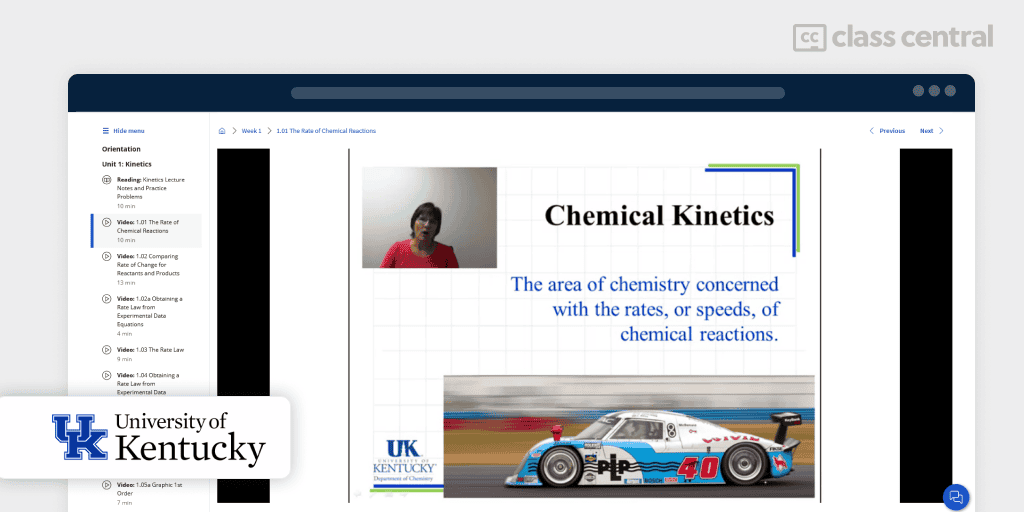
Advanced Chemistry is designed for students with a basic understanding of chemistry, focusing on advanced topics that align with the American Chemical Society’s standards. The course explores how reaction rates are influenced, the principles of equilibrium, the calculations of pH and pOH, and the factors determining reaction spontaneity.
You will learn about:
- Kinetics
- Chemical equilibrium
- Acid-base equilibria
- Aqueous equilibria
- Thermodynamics.
| Provider | Coursera |
| Institution | University of Kentucky |
| Instructors | Allison Soult and Kim Woodrum |
| Time Commitment | 17 hours |
| Enrollment | 91.3K |
| Rating | 4.7/5.0 (1.3K) |
| Cost | Free |
| Quizzes/Assessment Items | Free access |
| Certificate | Not available |
Best Short Course for Chemical Nomenclature (Udemy)
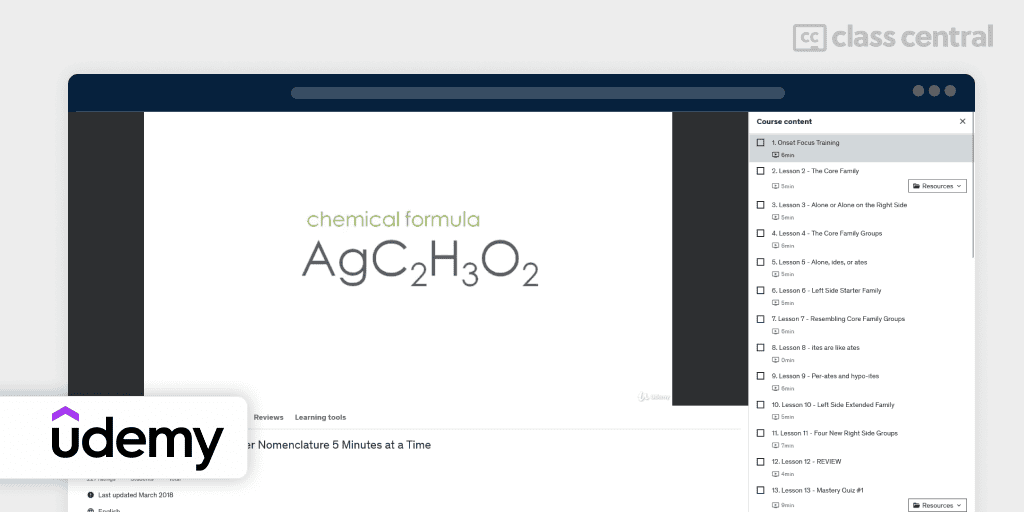
Understand the language of chemistry and learn more easily with Chemistry – Guided Memorization Nomenclature. This course aims to make learning chemistry enjoyable and successful through pattern recognition and deep integration of concepts. Some downloadable resources are included.
Syllabus:
- Introduction to chemical nomenclature
- Memorization techniques for 40 common elements
- Learning charges and structures of dozens of polyatomic ions
- Translating chemical formulas into substance names
- Converting substance names back into chemical formulas
- Understanding the role of nomenclature in chemical reactions and stoichiometry
- Developing problem-solving methods for oxidation-reduction processes and acid/base chemistry
- Training for automatic recall and deep integration of chemical concepts
- Recognizing patterns in chemical nomenclature to simplify learning
- Building confidence for academic success in chemistry
| Provider | Udemy |
| Instructor | Michelle Dicus |
| Time Commitment | 3-4 hours |
| Enrollment | 6.4K |
| Rating | 4.4/5.0 (227) |
| Cost | Free |
| Quizzes | Video-based |
| Certificate | Not available |
What Else?
Want a community for questions or ideas? Try Reddit’s r/chemistry with 2.8 million members and r/chemistryhomework with 5.5 thousand members.
Or search for chemistry on StackExchange.
If you’re stuck with a few specific aspects of chemistry or need to brush up your basic mathematics knowledge, Khan Academy is an amazing resource.
Why You Should Trust Us
Class Central, a Tripadvisor for online education, has helped 60 million learners find their next course. We’ve been combing through online education for more than a decade to aggregate a catalog of 200,000 online courses and 200,000 reviews written by our users. And we’re online learners ourselves: combined, the Class Central team has completed over 400 online courses, including online degrees. I’ve personally completed over 200 online courses in a variety of topics.
How We Made Our Picks and Tested Them
Trying to find “the best” can be daunting, even for those of us who live and breathe online courses. Here’s how I approached this task.
First, I combed through Class Central’s Catalog and the internet to find a variety of free and paid open courses, some with certificates. You don’t need to enroll in a university to learn chemistry.
When choosing courses, I considered the following factors:
- Course content: I examined courses that covered a range of topics and presentation styles, including the basics and more advanced topics. I watched some course videos to sample courses I hadn’t already taken
- Certificates and/or academic credit: I included some courses that offer certificates or academic credit. Make sure you check if you’re eligible for credit with your chosen course and institution
- Learner reviews: I read learner reviews (when available) to get a sense of the quality of each course, leveraging the Class Central database with its thousands of course ratings and reviews written by our users as well as available course provider reviews
- Popularity: I checked numbers of enrollments and views to find popular courses.
Ultimately, I used a combination of data and my own judgment to make these picks. I’m confident these recommendations will be a reliable way to learn chemistry.








